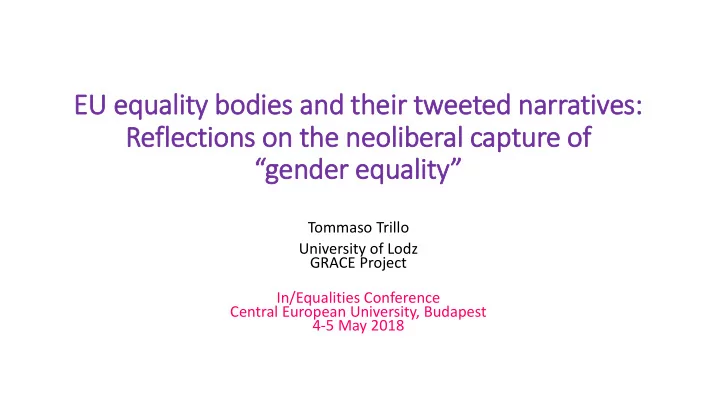

EU equality bodies and their tweeted narratives: Reflections on the neoliberal capture of f “gender equality” Tommaso Trillo University of Lodz GRACE Project In/Equalities Conference Central European University, Budapest 4-5 May 2018
Twitter as a space for political engagement Twitter is a micro-blogging platform that allows users to • Create a semi- public profile for themselves and ‘follow’ other users • post short messages known as ‘tweets’ (140 characters, expanded to a 280) • Broadcast their tweets to a community of ‘followers’ • Participate in aggregate conversation on specific topics via ‘ hashtahs ’ The social media platform ‘Twitter’ is owned by the for-profit corporation Twitter Inc., that capitalizes on user’s time and unpaid labor on the platform through different forms of targeted advertising (Fuchs 2013).
Why tweets by Equality bodies matter asymmetrical political attention economy of capitalism: “ Social media do not constitute a public sphere or participatory democratic space, but are rather colonized by corporations, especially by multimedia companies that dominate attention and visibility” (Fuchs 2013: 101) “Those who have a lot of reputation, fame, money or power tend to have many more followers than everyday people. Their tweets also tend to be much more often re-tweeted than common people’s tweets” (Fuchs 2013: 192) “attention and online visibility that enable meaning-making are asymmetrically distributed so that everyday users are at a disadvantage and celebrities and powerful organisations at an advantage” (Fuchs 2016: 172)
< < 95.6 Million Followers 324 Followers 25,000 Followers Pro-equality bodies enjoy more visibility than private users, but their visibility remains negligible when compared to that of entertainment-related profiles. While ‘resistant’ to an environment that is indifferent/hostile towards pro-equality arguments, EU Equality bodies are ‘hegemonic’ within the pro-equality milieu.
Vera Jurova FEMM Committee EIGE (@VeraJurova) (@EP_GenderEqual) (@Euogender) • Commissioner for • • European Institute for European Parliament’s Justice, Consumer rights, Committee on gender equality and Gender equality Women’s Rights and Gender Equality • 25,000 followers • • 9,600 followers 7,500 Followers • • • ≈ 150 tweets on ≈ 190 tweets on ≈ 490 tweets on equality issues last year equality issues last year equality issues last year
Neoliberalizing feminism ‘governance feminism’ (Halley 2006) The process through which selected feminist ‘faux - feminism’ ideas are integrated into neoliberal rationales (McRobbie 2009) and logics (Prügl 2015) ‘ free market feminism ’/ ‘ hegemonic feminism ’/ ‘imperial feminism’/ • equality as part of economic restructuring ‘managerial feminism’ (e.g. the business case for equality) (Eisenstein 2009) • integration of feminism into neoliberal ideology ‘ transnational (e.g. ‘empowerment’ as self - business feminism (TBF)’ entrepreneurialism) (Roberts 2012) • ‘feminist’ tools of governamentality ‘market feminism’ (e.g. mainstreaming toolkits, indexes, gap (Squires and Kantola 2012) measurements, etc.) ‘ post- feminism’ (Elias 2013)
Feminism as part of economic restructuring Growth and social fairness must go hand in hand. Combating #GenderPayGap is a priority #EuropeanSemester (@VeraJurova, 16 November 2016) "all the indicators show that greater involvement of women boosts economic well-being and employment" @EP_President #IWD2017 (@EP_Gender Equal, 8 March 2017) EIGE´s study shows how #EIGEeconomicBenefits of #GenderEquality lead up to millions of more jobs by 2050 - http://europa.eu/!Mj33FX (@Eurogender, 4 April 2017)
Empowerment and self-entreprenurship I end my busy #IWD2017 meeting wonderful young ladies with passion for #Tech. We have 2 encourage #GirlsInICT& #WomenInTech because #GirlCode (@VeraJurova, 8 March 2017) Stepping up women’s economic empowerment in private and public sectors: good for gender equality & boosting economy https://t.co/v3zXvHpebA (@EP_GenderEqual, 7 July 2017) EU-backed microcredits help #women, young people and migrants become entrepreneurs http://bit.ly/2mdU2Mz #IWD2017 #WomenEntrepreneurs (@EIB, 7 March 2017) That's good news! Looking for some more #goodpractices on #womenentrepreneurs? Check out EIGE's pool here - http://europa.eu/!MY66fn (@Eurogender, 7 March 2017)
Measuring, selling, consuming equality EIGE's study estimates that every year #VaW costs the EU 226 billion euro - https://t.co/bQBi0g8CJ5 #UNGA https://t.co/xlF2NNMaEH (@Eurogender, 22 September 2016) Do you know what gender discrimination means? Check the definition in #EIGE's #GenderEquality Glossary & Thesaurus - http://bit.ly/2r2aIYm (@Eurogender, 10 July 2017) #FridayFact: Did you know that you can build a Gender Equality Plan in five steps? Find out how here - http://europa.eu/!jv43MR #ShiftGEAR (@Eurogender, 28 October 2016)
Conclusions EU Equality bodies participate in the neoliberalization of feminism (Prügl 2015) via their tweeted narratives, either by • Embedding ‘feminist’ ideas into projects for economic restructuring • e.g. business case for equality • In particular, subordinating equality to macro-economic goals • Presenting ‘empowerment’ as a form of self -entrepreneurialism • e.g. ‘women in tech’ and ‘women entrepreneurs’ discourses • Offloading the responsibility for un- or under-employment on women • Developing ‘feminist’ tools of governamentality • e.g. EIGE’s products as tools of governmentality • Producing and governing the gendered subjects and her alleged needs
Thank you!!! Tommaso Trillo University of Lodz GRACE Project tommaso.trillo@uni.lodz.pl Twitter: @TommyTrillo
Recommend
More recommend